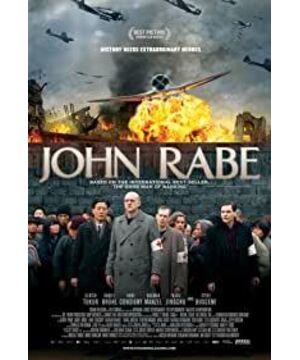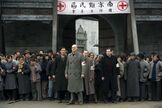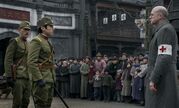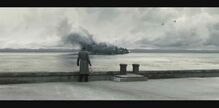Another commendable aspect of the film is that through the gradual change in the impression of others on Mr. Rabe, the reason for his respect is shown in the details. In the film, Rabe respects Hitler's head of state in his words and deeds. Some historical facts can also tell that he often said to others, "He is a staunch supporter of German National Socialism, and he supports this system 100%." However, Dr. Robert, who was extremely averse to the Nazis, did not take Rabe seriously at first. He believed that Rabe was just drinking tea and eating biscuits at the meeting and would not take any responsibility. He would also leave Nanjing with his wife Dora. . In getting along with Rabe, he gradually realized Rabe's noble feelings of active work and courage to contribute. So when he watched Rabe leave Nanjing, he sang the ballad praising Rabe passionately. There is a source of information that Dr. Robert’s letter to his family highly praised Rabe, saying that he was “a noble person in the Nazi circle, with a broad mind, and it is difficult to compare his noble personality with his attitude towards Hitler. "Fawning" is linked together".
In addition, the film made a reasonable assumption and structure of the Nanjing incident on this basis. For example, Rabe used the Nazi flag to protect the workers of the Siemens factory, witnessed the "killing competition" of Japanese military officers, and protected people in the academy. Chinese soldiers stepped forward and negotiated with Prince Hatohiko of Asaka Palace. Another example is the gathering of people at the dock in Nanjing at the end of the film to bid farewell to Rabe. Although this scene is not recorded in historical facts, I think it is understandable. As the director said, " He did a great thing, but almost no one knows his deeds, no one has thanked him, so in my heart I feel that I should give him such a farewell, so I set up this scene in particular."
The narrative of the whole film is smooth, without a sense of verbosity, and skillful, but perhaps because of this, there is less shock and more mediocrity. I feel a pity that the film is only at a better level. Perhaps because the original version lasted 5 hours and the final edited version only lasted more than 2 hours, some plots and characters seemed difficult to be fulfilled. The most obvious is Lang Shu played by Zhang Jingchu. Her personal experience in the film hardly overlaps with Rabe, especially the somewhat ambiguous dialogue and plot between her and Dr. Dawson, which seems a bit redundant, maybe In the 5-hour version, Zhang Jingchu's story can be more unfolded. In addition, the parting and reunion between Rabe and his wife, the plot handling is somewhat plain, and the whole scene at the end gives people the feeling (from Rabe being escorted by Japanese soldiers to seeing off at the dock of the people in Nanjing) a bit sensational and clichéd, but still It is touching, and it gives people a good feeling and comfort.
For some reason, the film ends here. It does not show Rabe's personal experience after returning to China. Perhaps it is that Rabe's experience in Germany has not yet been concluded by historians. Many records themselves are a mystery. I currently only get some stories about Mr. Rabe after returning to China in "Nanjing Catastrophe-The Forgotten Massacre" by Zhang Chunru, and I will briefly summarize here. According to the information provided by Rabe’s granddaughter Ursula Reinhardt, Rabe fulfilled his promise in Nanjing after returning to China, sending letters to Hitler and a copy of the Nanjing documentary filmed by John Magee and his own handwriting. Report, but a few days later, he was arrested and interrogated by the Gestapo, who warned him not to discuss or write on this topic. In the following years, Rabe's life became even more difficult. In the postwar years, he was even more accused by various parties such as the Soviet Union and Britain. Rabe's life in his later years was miserable. The family was crowded in a small house, hungry and cold. Fortunately, Rabe’s plight spread to China. The survivors of the Holocaust collected money and food for him and mailed them to his home until Rabe died of a stroke in 1950.
Mr. Rabe in "Rabe's Diary" is awe-inspiring. For such a great man, any words of praise seem to be exaggerated. I am very grateful for such a more objective film, which allows us to review the outstanding and immortal contributions made by Rabe and other staff of the Nanjing International Safety Zone Committee. I hope that this film is not only the beginning, but also can “spark bricks and jade” and show that history better.
"Every time the pulse beats-the belief that we must win.
Every time the daylight comes-endless struggle."
This is a verse given to him by his wife Dora that Mr. Rabe likes very much, and it is also A true portrayal of his life.
View more about John Rabe reviews











